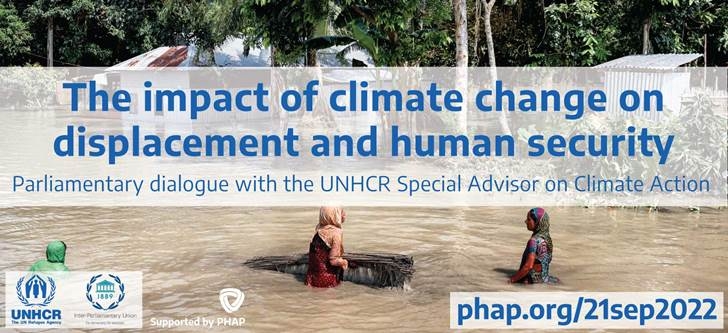Participation of the PABSEC International Secretariat in the virtual seminar on “The impact of climate change on displacement and human security”, 21 September 2022
Mr. Miltiadis Makrygiannis, PABSEC Deputy Secretary General attended the webinar on “the impact of climate change on displacement and human security”, on 21 September 2022.
The event was co-organized by the UNHCR and the IPU and supported by PHAP (International Association of Professionals in Humanitarian Assistance and Protection), and the main subject of discussion was the role of parliaments and the linkages between climate change, displacement, and human security. The speakers focused on challenges and solutions for disaster preparedness and prevention, access to services, and on building resilience for displaced and host populations affected by the climate emergency. It also provided a platform to identify opportunities to learn about tools to influence and monitor national actions tackling climate change. Moreover, the event featured a presentation by the UNHCR Special Advisor on Climate Action, drawing on UNHCR’s first-ever Strategic Framework on Climate Action, followed by a dialogue with parliamentarians to create an open space for sharing of information and good practices.
The opening was made by the IPU Secretary General Mr. Martin Chungong, who, inter alia, pointed out that the impacts of climate change on natural resources, livelihoods, and vulnerabilities can lead to displacement, worsening living conditions, as well as hampering the return of already displaced people. Despite their vulnerability, refugees, IDPs, and host communities have historically been severely under-serviced by climate adaptation support and excluded from disaster risk reduction strategies and measures.
All the discussants underlined that parliaments are central to implementing climate change and displacement responses, as well as ensuring access to protection and assistance during emergency crises, but also resilience in the long term. They ensure that treaties and commitments are translated into national legislation and that adequate budget allocations are made to support local adaptation activities and implementation of climate change and disaster laws and policies. It is characteristic that the data collection initiative by the LSE Grantham Research Institute and Sabin Center at Columbia Law School, in partnership with the Inter-Parliamentary Union (IPU), indicates that more than 2,120 climate laws and policies are currently in force worldwide

